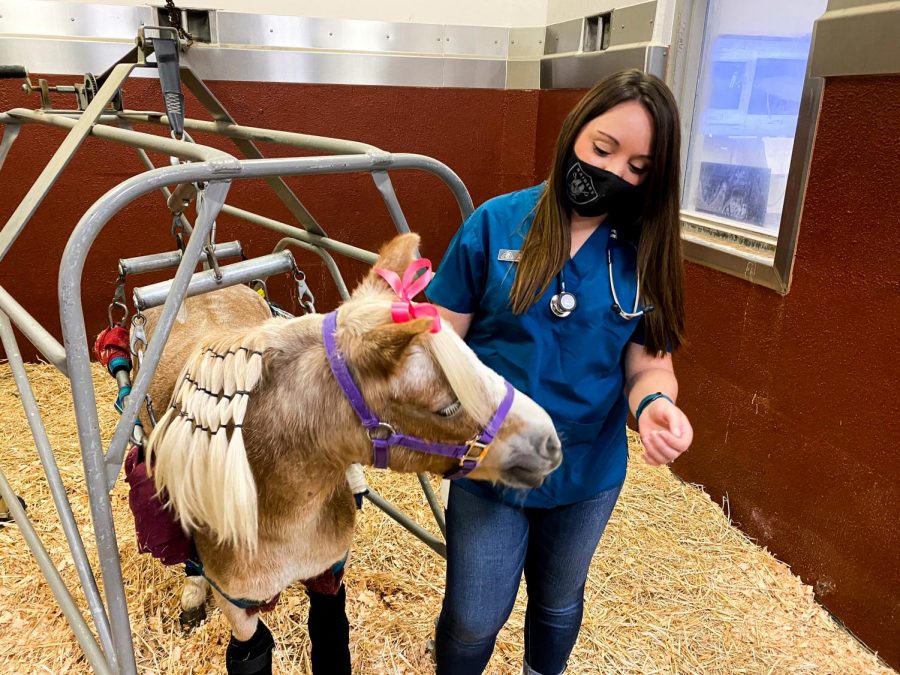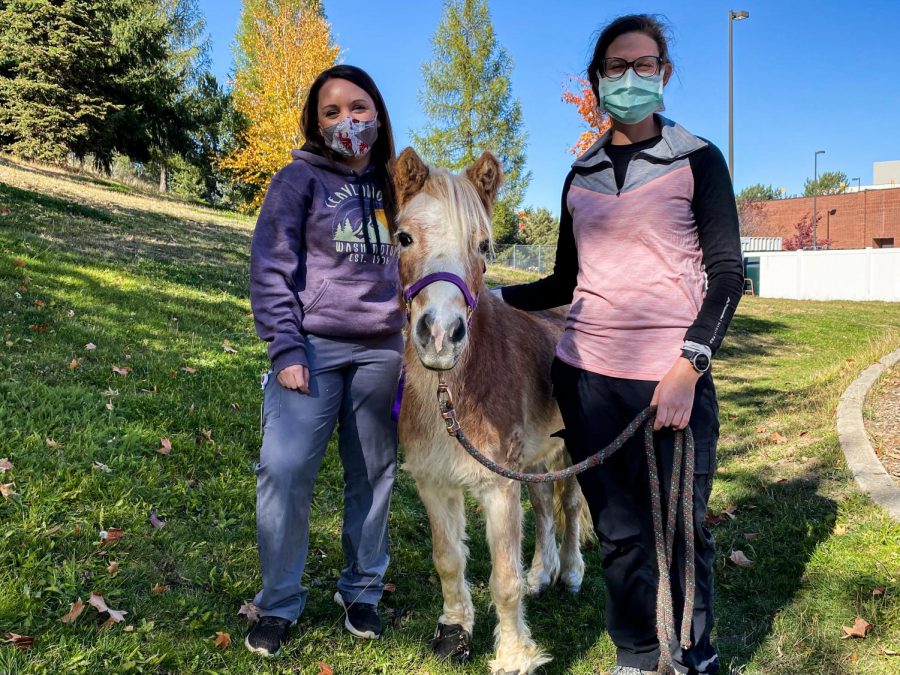Peaches the pony perseveres through injury
Before her injury, Peaches provided equine-assisted therapy to children and adults with disabilities
Peaches the pony is being held by a metal sling as she recovers from her paralyzing injury.
October 27, 2021
It took 10 weeks, but the WSU Veterinary Teaching Hospital helped a paraplegic miniature pony regain some of her mobility again.
Peaches, a 15-year-old miniature pony, developed a spinal cord injury after she got into an accident on a trailer. Owner Deb Smith said she was not there during the accident but later found Peaches had been pinned under a divider.
Smith is a registered nurse. But after taking care of Peaches at home for a couple of days, she and her husband realized they needed to take her to the vet hospital for more help.
Peaches was admitted to the hospital on Aug. 3. Her hind legs were paralyzed and was unable to stand or turn herself around, said Dr. Margaret Louie Genis, veterinary resident for equine medicine at the vet hospital.
Prior to her injury, Peaches was a therapy-driving pony, Smith said. She was in a pegasus program, which gives equine-assisted therapy to children and adults with disabilities.
“The reason we went to such lengths to save Peaches is she has done so many kids and so many disabled adults so much good,” Smith said.
Initially, Genis and her team administered conservative treatment, which consisted of giving Peaches vitamins and antioxidants to reduce neural inflammation. They also gave her supportive care by nourishing her and picking her up every couple of hours to help her stand, Genis said.
“She did get better by the sixth of August, so within three days,” she said.
Peaches was able to stand on her own with help from her caretakers, Genis said.
The goal of the conservative treatment was to avoid diagnostics like a CT or MRI scan, which would have cost more for Smith and her husband. Genis said Peaches’ quick improvement showed the hospital her injury was potentially treatable.
“Unfortunately, on Aug. 16, she had [a] really rapid regression,” Genis said. “She went from being able to sometimes get up and stand for up to four hours to being as bad as when she was admitted.”
It was after this that the hospital did a CT scan of Peaches’ back and found the 18th vertebrae on her spine was bilaterally fractured. On one side of the fracture, there was a fragment that displaced and was compressing her spinal cord. The fracture had moved, which caused Peaches to regress, Genis said.
She said Peaches is a lucky case. Had it not been for her small size and calm temperament, diagnostics would have been impossible.
Though surgery to fix the vertebrae was an option, Genis said the operation had high-risk factors that outweighed the benefits. She and her team decided to keep up with conservative treatment and rehabilitative care, but they proceeded with caution to prevent the fracture from worsening.
If Peaches had not improved, the worst-case scenario would have been euthanization, Genis said. Thankfully, Peaches’ bones had improved enough to send her home after the 10-week stay.
“She is home with us, and I have WSU to thank for it,” Smith said. “There is no way that just two human beings could’ve given her 24-hour care.”
Currently, Peaches is on six months of stall rest. But she is taken on two 10-minute walks a day.
Peaches became a learning experience for the vet hospital, Genis said. She also helped students affiliated with the hospital to feel more comfortable when handling equines.
Other horses with similar injuries would be too stressed, so not much would be able to be done to help them. It was thanks to Peaches’ calm temperament that the vet hospital was able to help her, Genis said.
Peaches’ injury proved to Genis and her team that time and supportive care is sometimes all that is needed to help.










